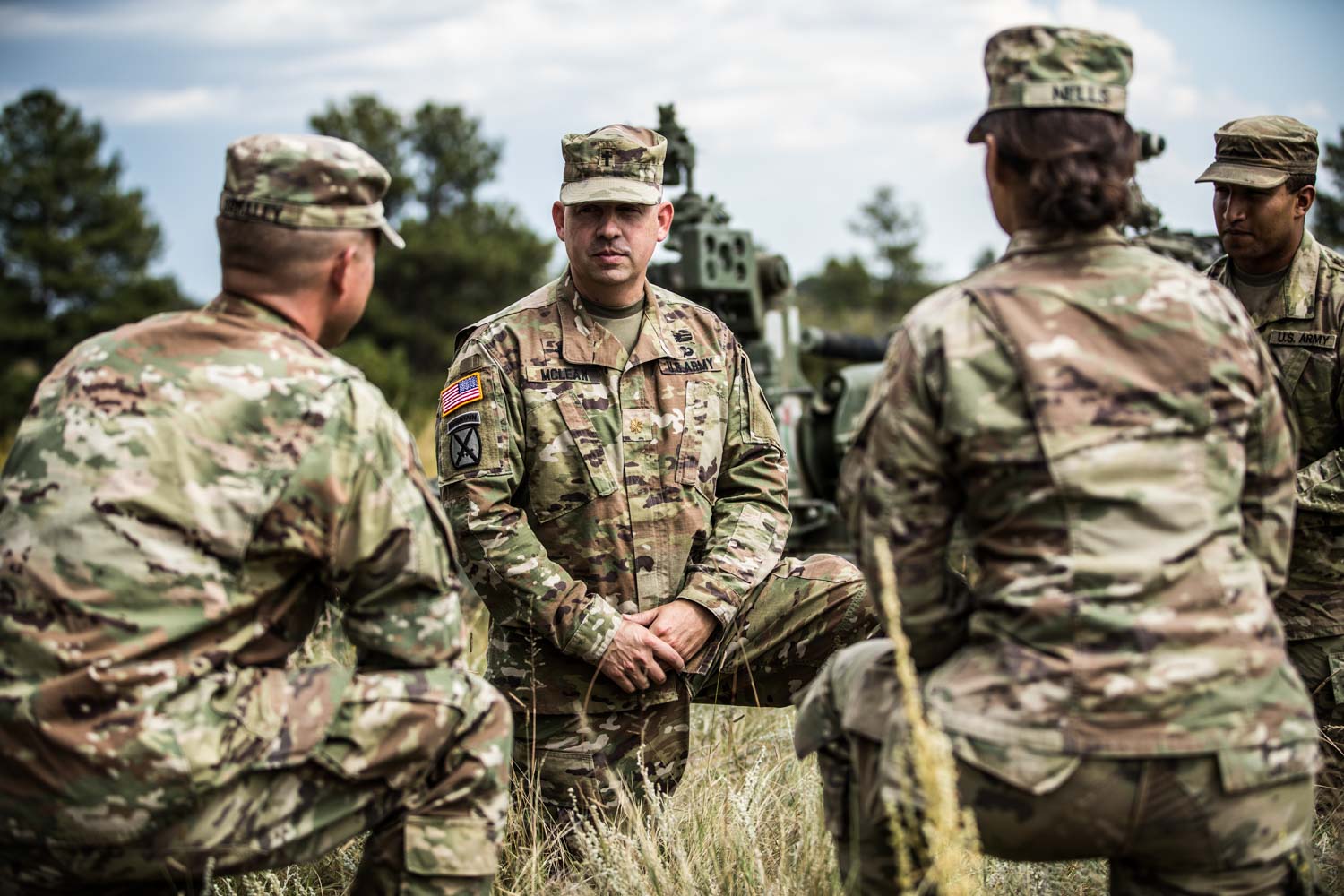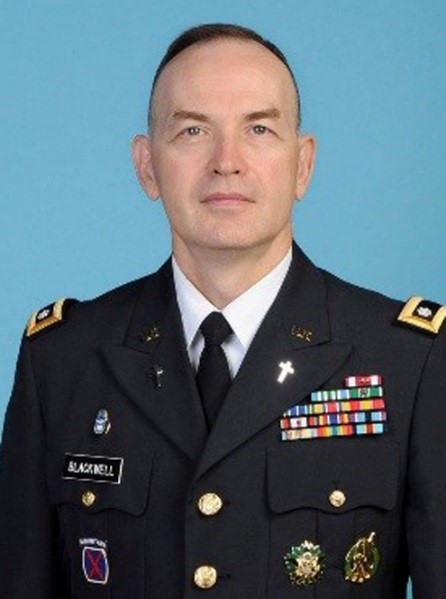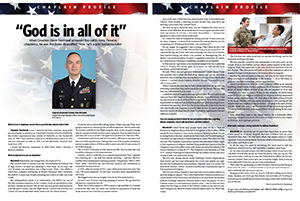
Chaplain (Major) Nathan Mclean speaks with a group of Soldiers in the field. (Official U.S. Army Photo)
When Chaplain Steve Blackwell answered the call to Army Reserve chaplaincy, he was five times disqualified. Now, he’s a gold badge recruiter.

What led you to chaplaincy service? Were you in full-time ministry before that?

Chaplain Recruiting Integration Officer, Medical Recruiting Brigade
Fort Knox, Ky.
Chaplain Blackwell: I was. I entered full-time ministry along with my enrollment in seminary at Vanderbilt Divinity School in Nashville. My student appointment was outside of Nashville, in the Clarksville area, in 1990. I was ordained a deacon in the Methodist church in 1992 and was ordained an elder in 1996. I served Methodist churches full-time from 1990.
I joined the Reserve component in 2003; that’s when I became a Reserve chaplain.
What prompted you to pursue chaplaincy?
Blackwell: Essentially, two things: first, the events of 9/11.
But, on a few other occasions in my life, I’d considered the military. Out of high school, I actually was applying to West Point. At the time, like a lot of people, my motivation was college money. Then, I was offered a full-tuition academic scholarship at Middle Tennessee State University. My wife of 35 years was already attending that school, so that’s the route I went.
My undergraduate degree is in mathematics, but MTSU has one of the best aerospace programs in the country. I took an introductory class, because I needed an elective. Part of that class was ground instruction for a private pilot’s license, and also flight lessons. I soloed that semester in a Cessna 150 and decided that’s what I want to do: be a Naval Aviator.
I took the test at a Naval Recruiting Station. Didn’t miss any. They were going to send me to Atlanta for the air officers physical. The recruiter said, ‘If you don’t qualify for the flight program, your scores are good enough that we can get you in the nuclear science program. You can either work on a nuclear sub or on a carrier.” I thought that sounded cool. That was 1984.
I went home and told my wife (we married in 1982) about my plans, and she was a little apprehensive. Taking either one of those paths would have put me in a place where, if I’d been able to serve out a full 20-year career, I’d be retired long ago.
But, it wasn’t God’s plan; at that time in my life, I had no idea that God would be calling me to full-time ministry.

Instead, I went to work first as a computer programmer. Then, I applied for a teaching job — my wife was already teaching — and was offered a middle school mathematics teaching position. I taught from 1986 to 1990. That’s when I answered my call: full-time ministry and enrollment in Vanderbilt Divinity School.
In 2001, after the events of 9/11, I got a little postcard in the mail that read, “We need chaplains.” At the time, I was five times disqualified for the Army.
The biggest issue was my weight. I was about 50 pounds heavier.
Second, I was 39 when I starting applying in earnest. The age limit for the Reserve component was 40.
Third, I had a back surgery in 1999 to repair a ruptured disk. So, I needed a waiver for that. Also, my vision was outside the parameters of what the Army wants to see corrected; so, another waiver.
And, at the time, I didn’t have my endorsement. In the United Methodist Church, that’s usually a year-long process because they only have one meeting a year when they consider those.
We were living in Nashville then, and the Chaplain Recruiter was in Atlanta, in the Bible Belt. He probably had 20 or more applicants who didn’t need any waivers. So, for me — five times disqualified — I assumed my application went to the bottom of the stack.
So, I called the Chief of Chaplain Recruiting and said, “I want to become an Army chaplain. I contacted the Southeast Recruiting Station, and I’m not getting a lot of response from them. Can you help me?”
For my weight, he suggested I start running. (That’s what he did.) That day, I walked into our local YMCA for the first time and saw a poster for a 5K. I paid my $35, got my T-shirt, and started training. I ran that one in October, then started seeking out others. I ran another on Thanksgiving Day. In March, I ran a half-marathon. In April, I completed a marathon: 26.2 miles. So, I went from no running to completing a marathon in six months.
In that process, I got down to the standard, weight-wise. So, I called the Chief of Chaplain Recruiting again. As it turns out, he’d run the same marathon, and I’d beat his time.
He said, “Steve, can you get your endorsement?” I didn’t know if that was possible, but I called the Endorsing Agency and got an Associate Endorser, who would later become the Endorser for the United Methodist Church — a retired Army chaplain, himself. He said, “Can you be in my office tomorrow?”
When I went in the next day, he had a phone interview set up with the endorsing committee; they interviewed me over the phone. The day after that, my endorsement was in hand.
I called the Chief of Chaplain Recruiting to tell him. The next phone call I got was from the Chaplain Recruiter in Atlanta. Soon afterwards, I had my appointment at Medical Exam Processing Station. Both of the consults required for the waivers I needed (orthopedist and ophthalmologist) were scheduled the same day. (Now that I’m on the other side of the desk, I know that that hardly ever happens; it usually takes at least 30 days to get any kind of a consult, let alone two.) By June, I’d raised my right hand to become a Reserve chaplain.
You’re in a unique position to know the misconceptions people have regarding military chaplaincy. Can we talk about those, and their realities?
Blackwell: I don’t think most people know what we do — how we function as chaplains. Many think we’re evangelists to the Soldiers. When people become chaplains, some see the Army as a big mission field. I’m just as evangelical as the next, maybe more than some, and I’m never going to turn down an opportunity to lead somebody to Christ. But, that’s not why we exist. The Chaplain Corps exists to protect the individual Soldier’s right to free expression of religion. Another thing people don’t know is that the Chaplain Corps is the oldest corps in the Army except for the infantry. The Army’s birthday is 14 June of 1775. The Chaplain Corps’ birthday is 27 July 1775. General Washington understood that his soldiers would only be as strong as they were spiritually strong.
We still exist, despite almost yearly challenges. Several organizations have tried to get the Corps eliminated; the courts have upheld our right, because the fundamental reason military chaplains exist is to protect the individual Soldiers’, Sailors’, Airmen’s and Marines’ fundamental right to free expression of religion.
The Doctrine of the Chaplain Corps says that I exist to either perform or provide religious support. I’m a United Methodist Protestant minister, so I can do whatever the church has ordained me to do: administer sacraments; perform weddings, baptisms, funerals; preach; teach the gospel. I’m not a Catholic priest, so I can’t perform a Catholic mass — but, it’s still my job to make sure the religious needs of the Catholic soldiers in my unit are met. Same things for my Muslim Soldiers, Jewish soldiers, and so on. That’s why I exist.
The Doctrine also talks about how we nurture the living, care for the wounded, and honor the dead.
We also provide counsel to the commander in two key areas: on the morale of his or her Soldiers, and as subject matter experts in the area of religion. That’s very applicable in the wars we’ve been involved in for the last 18 years. The commander will look to his or her chaplain to advise on matters of religion as it pertains to the mission they’re assigned.
Another big misconception is that we can’t pray in the name of Jesus. What you have to understand is, in the military — or in the Army, in general — we have ceremonies, and we have services.
There is no restriction from the Chief Chaplains Office on me praying anything I want to pray during a ceremony. But if I’m smart, I’m thinking about all those Soldiers in front of me who are required to be at that ceremony; they have no choice. To me, in that situation, it’s about being respectful of all the religious beliefs (or no religious beliefs) represented in that group. I have to think, OK, I can pray in the name of Jesus if I want to. No one has told me I can’t. But, again, out of respect — let’s just say, for that Jewish soldier who might be in that formation — if I pray in the name of Jesus, will that Solider ever come to me? I’ve burned a bridge by not being respectful. I’ve always said I can pray in the name of Jesus without saying ‘in the name of Jesus.’
Now, when they come to my chapel service, I’m a Protestant, Bible-believing, evangelical preacher. No Solider is required to be in that chapel; so, from me, you’re going to get Jesus.
What makes someone a strong contender for military chaplaincy?
Blackwell: For six of the last 10 years that I have been on active duty I have served as an Army Chaplain Recruiter. I believe God has more invested in that than I do, and that’s where that prayer comes in. I pray regularly, “God, you know whom You have called to this ministry; so, lead me to them, and them to me.”
In all the time I’ve spent in recruiting, I’ve never had to ‘sell’ the chaplaincy. And if I have to, that’s probably a chaplain I don’t want.
So, we want men and women who feel strongly called. In my own case, I decided I would only accept ‘no’ from the person who can say yes. The only person who could say yes was the Chief Medical Officer for the two waivers I needed. Then, it was up to me to lose the weight. Then, it was up to the Methodist Church to say yes to my endorsement.
That’s why I’m a gold badge recruiter: because I treat everyone sitting in front of me the same — it doesn’t matter to me if you need 10 waivers — until somebody who can say yes, says no.
Bringing it full circle, God is in all of it. If He isn’t calling you to be an Army chaplain, you won’t get that waiver. As a recruiter, all I’m doing is evaluating your qualifications; if you’re strongly called, then God will take care of the rest.
— Reporting by RaeAnn Slaybaugh
To learn more, visit GoArmy.com/Chaplain, call 1-888-550-ARMY (2769), or log on to GoArmy.com/locate-a-recruiter.html.



Hi, My name is Jane. l have great desire to do chaplaincy. How can you help me get connected please?Thanks